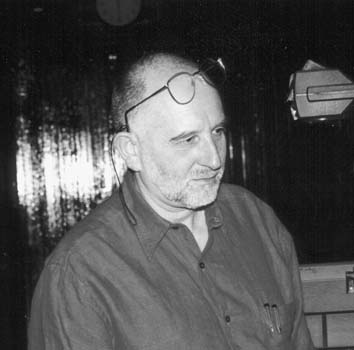Personal tools
News from ICTP 95 - Dateline

Former ICTP Diploma student, Saw Wai Hla, now with the
Free University of Berlin, Germany, has received widespread media
attention following the publication of his article (co-authored
with L. Bartels, G. Meyer and K.H. Rieder), "Inducing All
Steps of a Chemical Reaction with the Scanning Tunnelling Microscope
Tip: Towards Single Molecule Engineering," Physical Review
Letters 85 (25 September 2000). The research, which Chemical
and Engineering News 78 (2 October 2000) selected as one of
its top news stories for that week, is based on innovative 'tweezer'
applications of scanning tunnelling microscopes to construct what
may be the first 'hand-made molecule.' The finding could significantly
expand a chemist's tool kit for molecular synthesis.
Claudio Castellano, University of Essen, Germany; Matteo Marsili,
INFM Trieste - SISSA Unit; and Alessandro Vespignani, ICTP,
published "Nonequilibrium Phase Transition in a Model for
Social Influence," Physical Review Letters 85 (16
October 2000). The article, which uses mathematical formulas to
help explain how cultural norms are transmitted and sustained,
was discussed at length by Philip Ball in "Physics: Culture
Vultures," Nature - Science Update
(11 October 2000).
ICTP post doc Herman Julio Mosquera Cuesta spoke on the
German national radio network about his research on the relationship
between neutrino oscillations and supernova collapse. Cuesta's
findings were published in The Astrophysical Journal 544
(20 November 2000).
Hilda Cerdeira, staff scientist with the ICTP Condensed
Matter Group and head of the ICTP/TWAS Donation Programme, has
been elected to the editorial board of the International Journal
on Bifurcation and Chaos. The journal's editorial offices
are housed at the University of California, Berkeley.
ICTP's Physics of Weather and Climate Group (PWC) recently received two research grants from Italian funding institutions. The Rome-based Italian National Research Council (CNR) has awarded the PWC 30 million lire (US$15,000) to examine issues related to climate predictability, with a special focus on regions bordering with the Atlantic Ocean. The three-year grant will be administered under CNR's SINAPSI (Seasonal, interannual, and decadal variability of the atmosphere, ocean and marine ecosystems) project. Meanwhile, the Milan-based CESI (Centro Elettrotecnico Sperimentale Italiano Giacinto Motta), a government-sponsored applied research group devoted to examining and improving the management of the national electric system, has awarded the PWC a 120-million-lire (US$60,000) grant to participate in the development and validation of a seasonal forecasting system based on sequences of numerical models. Specifically, the one-year project will examine how to devise seasonal forecasts based on interrelated models that simulate ocean-atmosphere circulation and atmospheric circulation at high resolution on global and regional scales. ICTP researchers will focus on the high-resolution regional components of the forecasting system.

Sir Michael Berry
The annual Ig Nobel Prize, although not quite on par with the
announcement of the real Nobel Prize, is nevertheless an announcement
that captures a great deal of attention in scientific publications
and the popular press.
What's the Ig Nobel Prize, you ask? A sort of alternative (or
anti-) Nobel Prize that honours scientists whose achievements
"cannot or should not be reproduced." That translates
into unusual, eccentric or sometimes just plain goofy research.
The Igs, which are awarded by the science humour magazine Annals
of Improbable Research, are co-sponsored by the Harvard Computer
Society. Winners are selected by a committee that includes genuine
Nobel Laureates--Sheldon Glashow, for instance, who received the
Nobel Prize for physics in 1979 with Abdus Salam and Steven Weinberg.
Last October, the 2000 Ig Nobel Prize for physics was shared by
Andrey Geim of the University of Nijmegen, The Netherlands, and
Sir Michael Berry of Bristol University, United Kingdom.
Sir Michael, a highly respected physicist and member of the Royal
Society, won the ICTP Dirac Medal in 1995 for his discovery of
the non-integrable phase that arises in adiabatic processes in
quantum theory. He received the Ig Nobel Prize for another, more
profane, contribution to the world of science: "Using magnets
to levitate a frog and a sumo wrestler," according to the
citation that accompanied the prize. Simply stated, Geim and Berry
conducted research on a device that levitates plants, animals
and inanimate objects through the force of an intense magnetic
field (see News
from ICTP, Winter 2000, p. 9).
In the 'Ig Nobel' words of the two physicists, their work creates
a sort of "levitation without meditation." The paper
that prompted the award, "Of Flying Frogs and Levitrons,"
appeared in the European Journal of Physics (18, July 1997,
p. 307-313). The phenomenon they describe and have put into practice
is based on diamagnetism, the magnetic force created by the internal
motion of atoms, which can be used both for conducting experimental
research and teaching magnetism in schools. In one of the more
memorable Dirac Medal award ceremonies, Berry gave a practical
demonstration of diamagnetism at ICTP during his lecture. The
audience agreed it was an 'uplifting' experiment.
The most recent Nobel Prize winners, announced in October 2000, include Alan J. Heeger, University of California, Santa Barbara, USA; Alan G. MacDiarmid, University of Pennsylvania, Philadelphia, USA; and Hideki Shirakawa, University of Tsukuba, Ibaraki, Japan, who were awarded the prize in chemistry "for the discovery and development of conducive polymers." All three Laureates lectured at ICTP at the Adriatico Research Conference on "One-Dimensional Organic Conductors: Chemistry, Physics and Applications." Heeger also lectured at the Adriatico Research Conference on "High Temperature Superconductors." Both conferences took place at the Centre in July 1987.
Vinod Chandra Tewari, senior scientist at the Wadia Institute of Himalayan Geology, Dehradun, India, was honoured by the International Biographical Centre, Cambridge, UK, as an International Man of the Year for 1999-2000, for his outstanding research work on precambrian life of the Earth (Himalaya), and more specifically his studies on its early evolution and genetic significance in the transition from unicellular to multicellular microbes in the sediments in the Dehradun district. V.C. Tewari is a Regular Associate of ICTP (1998-2003).
Titilayo Adelaja Kuku, ICTP Regular Associate 1992-2003 and Fellow of the Training and Research in Italian Laboratories (TRIL) Programme, has been appointed Head of the Department of Electronic and Electrical Engineering of Obafemi Awolowo University in Ile-Ife, Nigeria (see News from ICTP, Spring 1998, p. 12-13). He assumed the post from Adebayo Gabriel Adegboyega, former ICTP Regular Associate 1984-1998, who is now Dean of the Faculty.